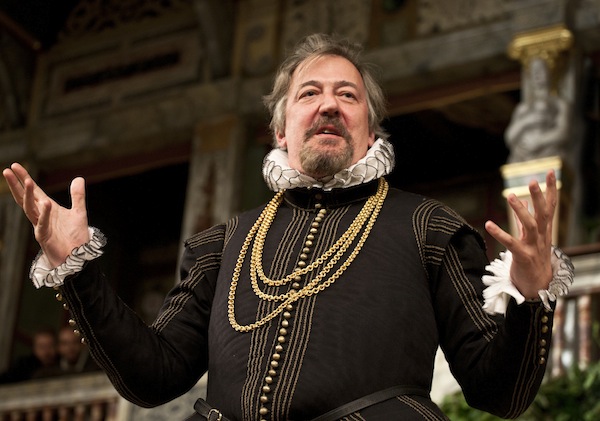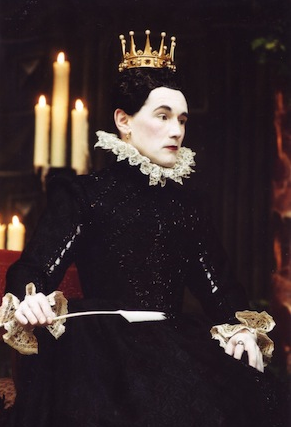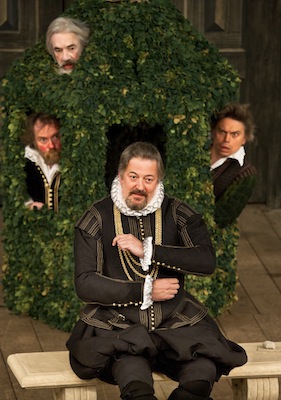Such was the secrecy engulfing Stephen Fry’s performance at The Globe this season, we haven’t even been able to talk about it until now. That is, now that it is safely ensconced in the West End, where it is at The Apollo for another run. Also, presumably, now that public opinion has been firmly set independently of any nasty critics who might have come after Fry with burning torches and chased him all the way back to Belgium. You have heard that story by now, haven’t you? I would Google it if, evidently, you’ve been living under a bush.

It might be a bit mean to mention ‘the incident’ again but I’m not sure that so many people would have done had the press not been so deliberately silenced on Fry’s performance – his first since that aborted attempt in 1995 – which, to my mind, isn’t so exciting in the gossipy will-he-stumble-at-the-first-hurdle sort of way but thrilling in the extreme for two other reasons. For a start, it’s bloody Stephen Fry (nation’s sweetheart, brain of Britain, etc. etc.) and we’re finally seeing him on the stage; added to which the role of Malvolio couldn’t be better suited to him, and might only be topped by his perfect portrayal of Mr Jeeves.
Either way, there wasn’t much for a critic in their right mind to attack. Fry was a most reverent, pompous and tragic Malvolio, whose cross-gartered flirtations brought tears to the hysterical audience’s eyes. His imposing physical form made this steward’s attempts at wooing his mistress all the more ridiculous as he tiptoed around, hopelessly attempting to look dainty and coy, before going in for the kill and making an absolute fool of himself by demonstrating the main verb of “some have greatness thrust upon them” with vigour enough to have given Mark Rylance’s nervous little Olivia a heart attack. And that certainly wasn’t the intention. As always with a much-loved character playing Malvolio, one ended up feeling incredibly sad at the subsequent torment that he undergoes at the hands of his excitable colleagues, as all traces of dignity – the one thing he treasures most – go out the window. Yet it helps to remember what an upstart he was to begin with, and Fry was very good at that. He was very good at bringing out the words too, breathing freshness into them with well-judged wit: as he read the love letter supposedly written by Olivia, his astonished ‘oh,’ dreamily whispered upon recognising the last sound of his own name, triggered giggles from even the burliest of men watching.
Rylance made a wonderfully fussy Olivia and this was an interpretation unlike most, making her an anxious, vulnerable and fussy slip of a woman  rather than the cold, superior and bolshie Countess that you usually get. I still cannot fathom how Rylance managed to skim across the stage as he did – his voluminous Elizabethan skirt seemed to be on wheels as he glided in a strangely hurried fashion (at all times) from here to there. With fretful twitches and an agitated tone, this Olivia was more clearly than ever a pawn in everyone else’s game – from her suitors to her uncle and maid. This made the dynamic between her and her loyal servant, Malvolio, all the more touching since she really didn’t have any part in the deception that so hurt him and, moreover, this neurotic wreck probably couldn’t have done if she’d tried. That said, Rylance certainly wasn’t all doom and gloom and knows exactly how to tickle an audience – he sounded like a besotted schoolgirl as he clasped his head in his hands, whining “what is your parentage?” and cringing at the awkward conversation with Olivia’s crush as anyone else would. His breathless and astonished “most woooonderful” as Olivia is then faced with two versions of that crush was side-splitting.
rather than the cold, superior and bolshie Countess that you usually get. I still cannot fathom how Rylance managed to skim across the stage as he did – his voluminous Elizabethan skirt seemed to be on wheels as he glided in a strangely hurried fashion (at all times) from here to there. With fretful twitches and an agitated tone, this Olivia was more clearly than ever a pawn in everyone else’s game – from her suitors to her uncle and maid. This made the dynamic between her and her loyal servant, Malvolio, all the more touching since she really didn’t have any part in the deception that so hurt him and, moreover, this neurotic wreck probably couldn’t have done if she’d tried. That said, Rylance certainly wasn’t all doom and gloom and knows exactly how to tickle an audience – he sounded like a besotted schoolgirl as he clasped his head in his hands, whining “what is your parentage?” and cringing at the awkward conversation with Olivia’s crush as anyone else would. His breathless and astonished “most woooonderful” as Olivia is then faced with two versions of that crush was side-splitting.
The more overtly comic characters certainly did add jollity to proceedings, with Maria a total ringer for Blackadder’s Nursie and a suitably ruddy faced Sir Toby; Colin Hurley drunkenly lolloped into view with enough of a hint of malice in his countenance when required to counteract the harebrained shenanigans that define his character. His asinine sidekick was a vague and yet sensitive Roger Lloyd Pack as Sir Andrew Aguecheek who, I must admit, does not have the legs for a hose and stockings. Rather amusing to look at all the same. This lot provided a good amount of slapstick, hiding in trees and so on, which brought out the joyful silliness of this comedy.
 What was very sobering was the melancholic jester, Feste, who gave pause for thought in a slightly Puck-like fashion with a world-weary expression and dead-pan delivery. He had rather a nice singing voice too. Sombreness also came from (the real) Sebastian and his friend Curio, who are not part of the disguises or romances or conspiracies keeping everyone else busy, but bare the brunt of their effects. Or, at least, Curio does – Sebastian actually lands on his feet but I have always found something very sinister in the way that he so casually (and quickly) goes along with Olivia when she mistakes him for Cesario; here is a woman who very clearly thinks he is someone else, someone who she knows, and Sebastian, rather than coming clean, agrees to marry her after two minutes without having the decency to admit that he isn’t who she thinks he is. Then he goes and beats up her uncle – who may be obnoxious but isn’t in a physical state to pose any real threat – and shows no remorse, saying that he had no choice but to do so. Not the nicest of people. There’s not a lot else to be said for the Sebastian you see here so this was the overriding impression, but it added balance to an otherwise ridiculous tale.
What was very sobering was the melancholic jester, Feste, who gave pause for thought in a slightly Puck-like fashion with a world-weary expression and dead-pan delivery. He had rather a nice singing voice too. Sombreness also came from (the real) Sebastian and his friend Curio, who are not part of the disguises or romances or conspiracies keeping everyone else busy, but bare the brunt of their effects. Or, at least, Curio does – Sebastian actually lands on his feet but I have always found something very sinister in the way that he so casually (and quickly) goes along with Olivia when she mistakes him for Cesario; here is a woman who very clearly thinks he is someone else, someone who she knows, and Sebastian, rather than coming clean, agrees to marry her after two minutes without having the decency to admit that he isn’t who she thinks he is. Then he goes and beats up her uncle – who may be obnoxious but isn’t in a physical state to pose any real threat – and shows no remorse, saying that he had no choice but to do so. Not the nicest of people. There’s not a lot else to be said for the Sebastian you see here so this was the overriding impression, but it added balance to an otherwise ridiculous tale.
This all-male production gave the plot’s who’s who the hilarity it deserves, and was nothing but a delight to watch. At the end, the entire cast joined together in dance and Mark Rylance definitely got the giggles, which showed how much fun they were all having and most certainly rubbed off on the rest of us. We watched from the standing places in the pit and being a pleb never paid off so well – best view in the house and only a fiver. The chance to see such high quality acting in such close proximity is rare and not one member of the cast let it down. If only everybody could get to see it, so thank goodness the run isn’t over now that it’s vacated The Globe.
Twelfth Night transfers to the Apollo Theatre on Tuesday 20th November and runs until 3rd February 2013. For more information and to book tickets, visit the website.



